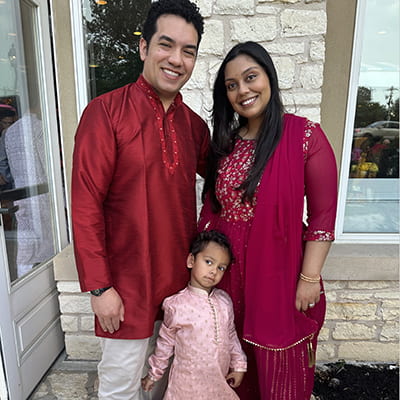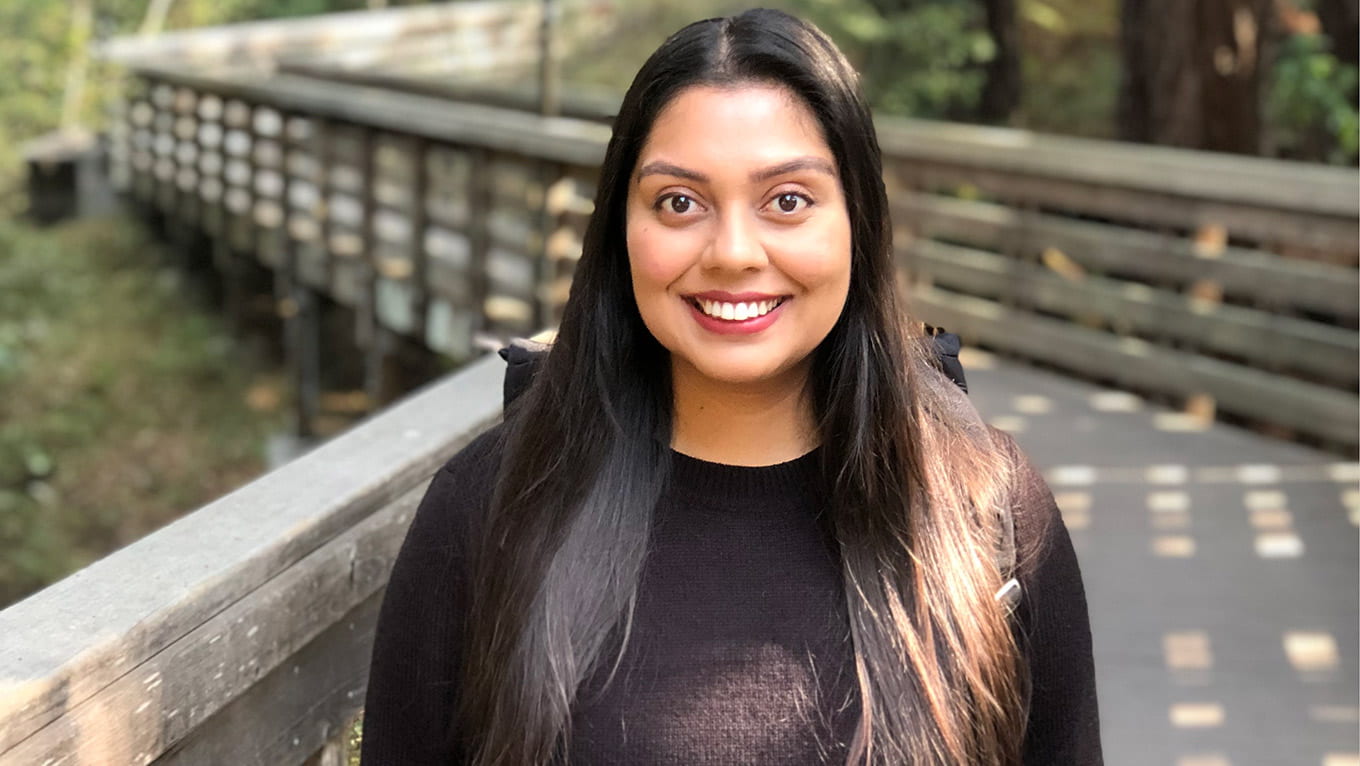From developing hydroponic engineering farms to helping build the world’s first 3D-printed rocket, UC Santa Cruz alumna Sangeetha Mandyam Komar (MK) Baker has applied her extensive robotics engineering knowledge and expertise to drive innovation across a wide range of industries.
Every career role MK Baker has taken on has been guided by a passion to blend software and hardware engineering concepts to create technology that solves complex problems, while also making a profound social impact.
“I knew as soon as I graduated that I only wanted to pursue a robotics engineering role that would allow me to meld together hardware, software, and mechanical engineering,” MK Baker said. “I didn’t want to do just one or the other because I thoroughly enjoy merging all of those concepts together to come up with a unique product that would make an impact on humanity.”

A passion for robotics engineering
For MK Baker, the beauty of campus was secondary when choosing to study at UC Santa Cruz. It was the engineering school that drew her in after seeing students in the Engineering Logic Design Lab write software and work on hardware projects while on a campus tour.
Although she began her UCSC career as a bioengineering student with plans to go to medical school, she found herself gravitating more toward electrical engineering courses. She eventually switched into the network and digital technology bachelor’s degree program.
“It was really exciting to be a part of a program that offered classes in both electrical and hardware engineering,” MK Baker said. “My favorite classes were logic design and mechatronics.”
While at Baskin Engineering, she also got the chance to pursue undergraduate research in then UCSC Professor Jacob Rosen’s bionics lab, which strengthened her passion for robotics engineering.
“It’s pretty unique to get research opportunities as an undergraduate, so that was definitely an experience I was grateful for. I really enjoyed the opportunity to practice what I learned in the classroom and play around with different robotics equipment,” MK Baker said.
Beyond academics and research, she enjoyed the sense of community on campus.
“Regardless of your major, there was always a chance to connect with other students,” MK Baker said. “Everyone was really inclusive, and I’m still friends with many of my fellow Slugs.”
Optimizing her niche
After graduating, MK Baker was determined to find robotics engineering roles that would allow her to exercise her strengths in software and hardware engineering. Her first career role was at Kawasaki Robotics, where she did motion path planning and programming for semiconductor robots on the assembly line. After, she transitioned into the startup environment, landing roles at the electric vehicle company Faraday Future and a hydroponics engineering farm startup, and more recently Relativity Space.
MK Baker explained that working at startups, although they can be overwhelming with the level of work and long hours required, allowed her to work closely with leadership and different cross-functional teams, providing her new insights around business operations and teaching her the importance of being collaborative and adaptable.

One of MK Baker’s proudest career achievements is working on the world’s first 3D-printed rocket, known as Terran 1, at Relativity Space. From 2018 to 2021, she was on the Relativity Space team responsible for 3D-printing the rocket body.
“3D-printing allowed for lots of experimentation. It was definitely an iterative process, where we often played with many different variables to optimize the rocket body for launch,” MK Baker said.
Earlier this year, Terran 1 launched. Although it did not reach orbit, it did achieve its max stress point, attaining a historical milestone for the first rocket of its kind and an extremely exciting moment for MK Baker.
“When Terran 1 reached Max-Q, I was getting calls, texts, and facetimes from my old colleagues. We were all celebrating together. Seeing the technology I worked on reach this milestone was mind blowing,” MK Baker said. “For anyone in a startup environment, if you have an opportunity to see the whole product lifecycle through, stay. You learn a lot throughout that whole process. Taking things to completion is not something to take for granted.”
MK Baker now works as an engineering manager at Millennium Space Systems, a Boeing company founded in 2001 that delivers high-performance satellite constellations for critical national security space missions. As engineering manager, she runs a multidisciplinary team within the satellite testing division.
Although MK Baker dealt with imposter syndrome coming into a managerial role for the first time, her practice of looking at each new experience as a great learning opportunity has helped her build the confidence needed to propel forward in her career. She hopes as engineering manager, she can be a role model for other women and underrepresented minority engineers to promote diversity in the tech workforce.
“I think it’s important to note, especially for the female-identifying aspiring engineers, I didn’t have the most amazing grades ever. I’m not a genius,” MK Baker said. “A lot of the technology I got to work on and the opportunities that have been presented to me have been due to being open-minded, collaborative, a quick learner, and genuinely interested in what technology can do. Those traits, maintaining a sense of confidence, and having a strong support system is what led me to where I am today.”
– SHARE THIS STORY –
You May Also Be Interested In
-

2025 Dean’s Awards highlight outstanding Baskin Engineering undergraduate research in AI, cybersecurity, biomedicine, and more
-

Baskin Engineering students sweep SC Launchpad 2025 awards in technology and social impact categories
-

First annual UC Open Summit highlights open source innovation in the UC system

